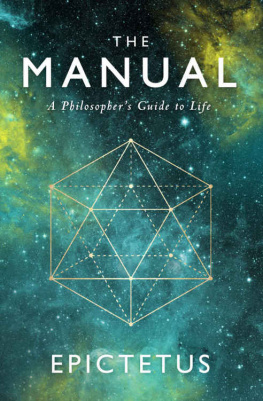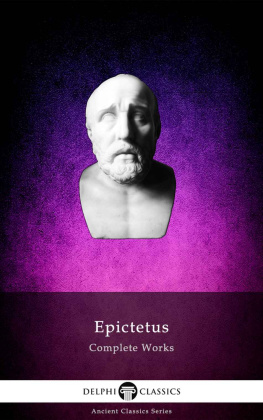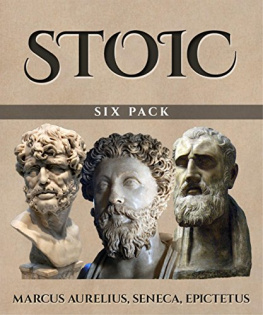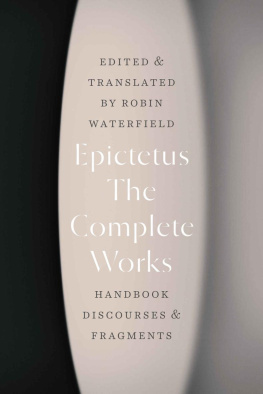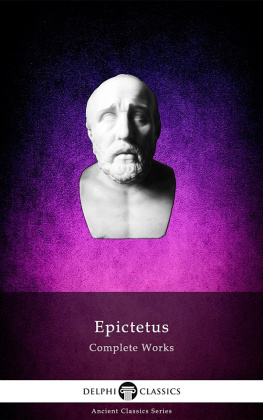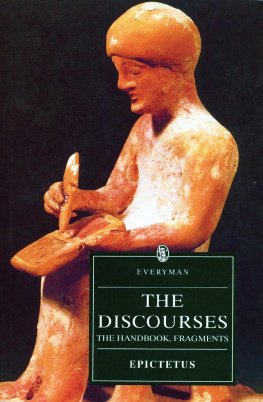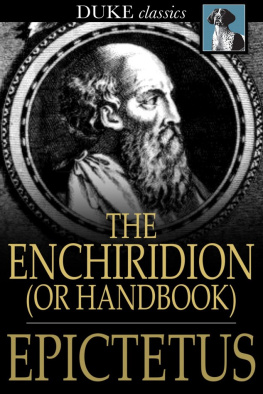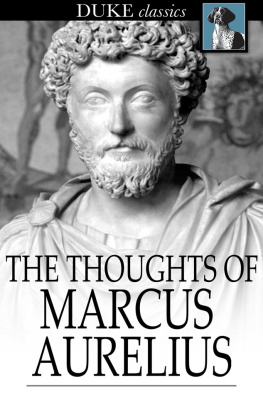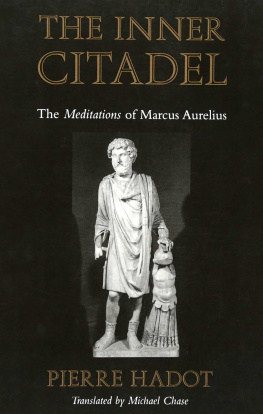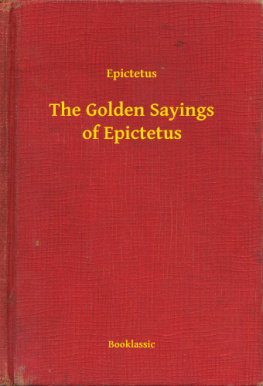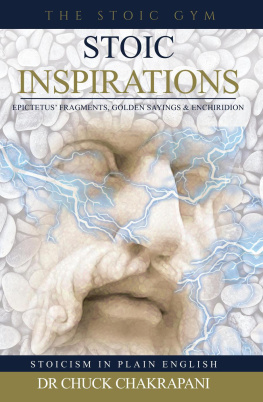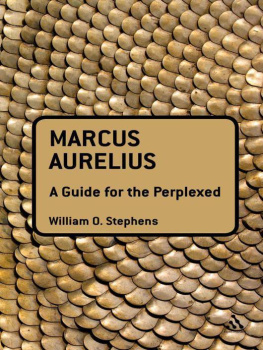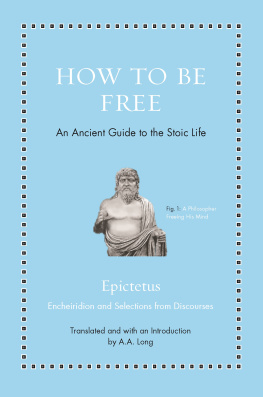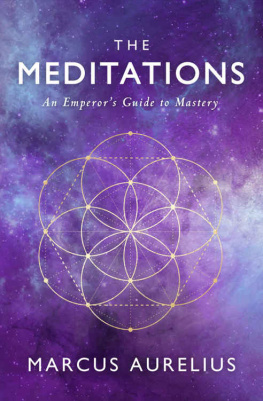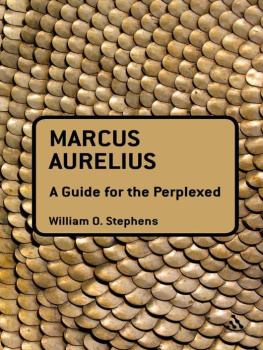The
MANUAL
A Philosophers Guide to Life
_______
EPICTETUS

Ancient Renewal
[ see all our titles here ]
Rendered in contemporary English by Sam Torode,
from a translation by Thomas Wentworth Higginson.
Text and design copyright 2017 Sam Torode
_______
Related Books from Ancient Renewal:
The Meditations: An Emperors Guide to Mastery
Tao Te Ching: The Book of the Way
Foreword
________
In the Fall of 2008, as the world plunged into the worst economic crisis since the Great Depression, I experienced my own collapsea marital separation, leading to divorce.
Enduring each day became a struggle. My inner landscape (my mind) was now a war zone. Daydreamingpreviously my refugebecame dangerous. My imagination could only conjure despair.
I desperately needed peace of mind.
For the first time in my life, I ventured into the Self-Help section of the bookstore, and worked my way through every title. Things Id always scoffed atlike positive thinking, affirmations, and visualizationwere now of vital interest. Even the cheesiest volumes usually had something of value to take away. For instance, from Rhonda Byrnes The Power (a sequel to The Secret a book Id often mocked), I copied down this sentence: Every challenge is presented to you so that you will choose love and turn away from negativity and blame.
I also combed the nearby Philosophy aisle, where I discovered two ancient books that proved to be the most helpful of all: the Manual of Epictetus and the Meditations of Marcus Aurelius.
Epictetus and Marcus Aurelius are pillars of the Stoic school of philosophy. Stoicism doesnt mean repressing emotion and shunning pleasure, I learned, butin essencefocusing on what is in our power and letting go of everything we cant control.
Stoic philosophy, I found, is at the foundation of the best modern self-help approaches, such as rational emotive therapy, cognitive behavioral therapy, and positive psychology. (Its influence is even reflected in the Rhonda Byrne quote above).
When you are feeling upset, angry, or sad, Epictetus said, dont blame another for your state of mind. Your condition is the result of your own opinions and interpretations....
When anyone provokes you, remember that it is actually your own opinion provoking you. It is not the person who insults or attacks you who torments your mind, but the view you take of these things.
Do not be fooled by how things first appear. With time and greater perspective, you can regain inner peace.
Epictetus and Marcus Aurelius offered practical help, here and now. They showed that by changing my thoughts about a situation, I could immediately let go of pain.
The way to peace of mind, they taught, was in tending the garden of my own mind (by nurturing the positive and weeding out the negative) and disregarding other peoples opinions of and actions towards me.
Other books that I found particularly soothing at this time were the Tao Te Ching and Ralph Waldo Emersons Nature . As a writer and book designer by trade, I decided to create my own editions of these works. I saved the Manual and Mediations for last.
Nearly ten years after first discovering the wisdom of Epictetus and Marcus Aurelius, I made it part of my daily morning routine to study a passage from an old translation of their words and re-write it in simple, contemporary language.
While I created these versions for my own use, I am also making them available publicly. If you are searching for peace of mind, I hope you benefit from the Manual and Meditations as much as I have.
Sam Torode
I welcome your comments about this book at sam.torode@gmail.com.
To keep up with future releases, follow me on Amazon and/or Facebook:
www.amazon.com/author/samtorode
www.facebook.com/SamTorodeBooks
________
There are things that are within our power, and things that fall outside our power. Within our power are our own opinions, aims, desires, dislikesin sum, our own thoughts and actions. Outside our power are our physical characteristics, the class into which we were born, our reputation in the eyes of others, and honors and offices that may be bestowed on us.
Working within our sphere of control, we are naturally free, independent, and strong. Beyond that sphere, we are weak, limited, and dependent. If you pin your hopes on things outside your control, taking upon yourself things which rightfully belong to others, you are liable to stumble, fall, suffer, and blame both gods and men. But if you focus your attention only on what is truly your own concern, and leave to others what concerns them, then you will be in charge of your interior life. No one will be able to harm or hinder you. You will blame no one, and have no enemies.
If you wish to have peace and contentment, release your attachment to all things outside your control. This is the path of freedom and happiness. If you want not just peace and contentment, but power and wealth too, you may forfeit the former in seeking the latter, and will lose your freedom and happiness along the way.
Whenever distress or displeasure arises in your mind, remind yourself, This is only my interpretation, not reality itself. Then ask whether it falls within or outside your sphere of power. And, if it is beyond your power to control, let it go.
________
Desire demands the attainment of that which you desire, and aversion demands the avoidance of that which you dislike. Those who fail to attain their desires are disappointed. Those who attain what they dislike are distressed.
If you avoid only those undesirable things which are within your control, you will never suffer by attaining something you detest. But if you try to avoid what you cannot controlsickness, poverty, deathyou will inflict useless mental suffering upon yourself.
End the habit of despising things that are not within your power, and apply your aversion to things that are within your power. As for desire, for now it is best to avoid it altogether. Those new to this philosophy must first secure their sphere of power, before they can discern what is worthy of desire. For if you desire things not within your power, you will suffer disappointment.
When practical necessity demands that you desire or avoid something externalat work, for instanceact with steady deliberation, not hasty strain.
________
What of things, objects, and beings that delight your mind, are of good practical use, or which you dearly love? Remind yourself of their true nature, beginning with the smallest trifle and working upward.
If you have a favorite cup, remember that it is only a cup that you preferif it is broken, you can bear it.
When you embrace your wife or child, remember that they are mortal beings. By accepting their nature rather than denying it, if either should die you will find the strength to bear it.
________
In preparing for any action, remind yourself of the nature of the action.
For instance, if you are going to a public pool, remind yourself of the usual incidents: people splashing, some pushing, some scolding, thieves stealing unguarded personal belongings. You will not be disturbed if you go into the experience prepared for such things and determined to retain inner harmony.
If something undesirable happens, you will be able to say, My desire is not only to swim, but to remain in harmony with the nature of things. I cannot stay in harmony if I let myself become upset by things beyond my control.
And so it is with every act or experience.
________
People are not disturbed by things themselves, but by the views they take of those things. Even death is nothing to fear in itself, or Socrates would have run from it. The fear of death stems from the view that it is fearful.
Next page
